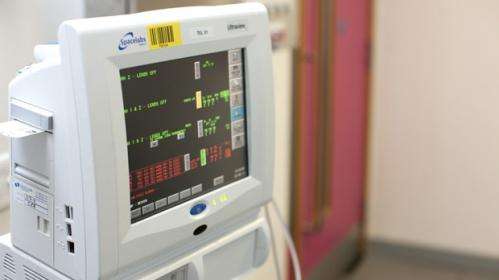Double dose of genes can trigger poor cancer survival

(Medical Xpress)—Cancer Research UK scientists have shown that accidental DNA doubling in bowel cancer cells could predict which patients have potentially poor survival and help doctors plan their treatment, according to research published in Cancer Discovery this week.
In a two year study the team at Cancer Research UK's London Research Institute grew normal bowel cancer cells with just one set of genes, alongside cancer cells containing exactly the same genetic information – but doubled. The doubling of a cell's entire gene set - the genome - happens for many reasons, for example when a cell fails to divide properly in two after duplicating its DNA.
The team found that cancer cells with doubled genomes were highly unstable and rapidly accumulated further genetic damage. Cancer genome doubling enables tumours to evolve rapidly and develop diversity. In turn this diversity is a contributing factor to cancer drug resistance.
The scientists also examined data from 500 bowel cancer patients which showed a link between cancer genome doubling and poor survival.
Study author, Professor Charlie Swanton at the Cancer Research UK London Research Institute, said: "We've closely watched cancer cells growing in the laboratory for over two years to spot the ways that tumours can change over time.
"Interestingly we've seen that genome doubling in cells can encourage haphazard DNA development making the cells extremely unstable and the tumours very genetically diverse. We know that patients do worse if they have tumours with a lot of cell instability – one reason being they become resistant to many types of targeted treatment.
"Detecting genome doubling in cells could help predict those patients with early stage bowel cancer at higher risk of spreading– a time when important decisions about treatment need to be taken to limit the risk of disease coming back."
Around 40,700 people in the UK are diagnosed with bowel cancer each year and there are around 15,700 deaths each year from the disease.
Dr Kat Arney, Cancer Research UK's science information manager, said: "We've seen dramatic progress in bowel cancer research which has led to survival rates doubling over the last 40 years, but there is much more to be done. There's an urgent need to find new treatments for patients whose cancers have become resistant to treatment.
"Research to understand why cancer cells become genetically unstable, leading to poor survival, is vital if we are to find more effective treatments and identify targets for new therapies."
More information: Whole genome doubling propagates chromosomal instability and accelerates cancer genome evolution. Dewhurst and McGranahan et al. Cancer Discovery.


















